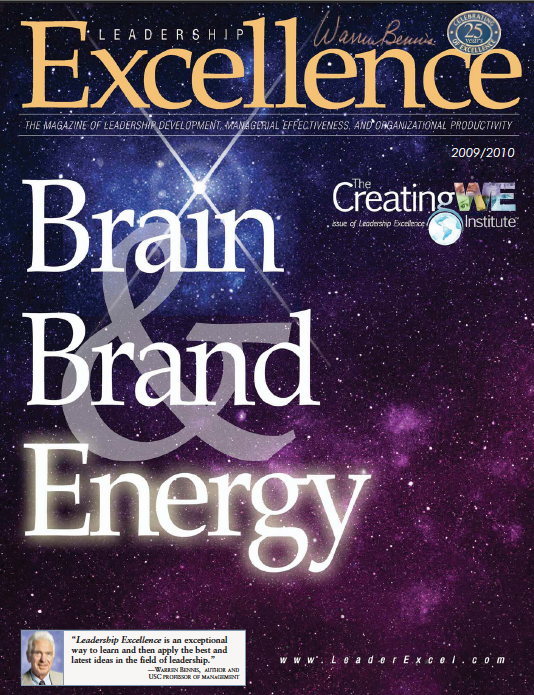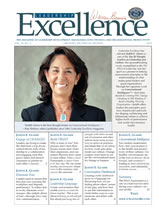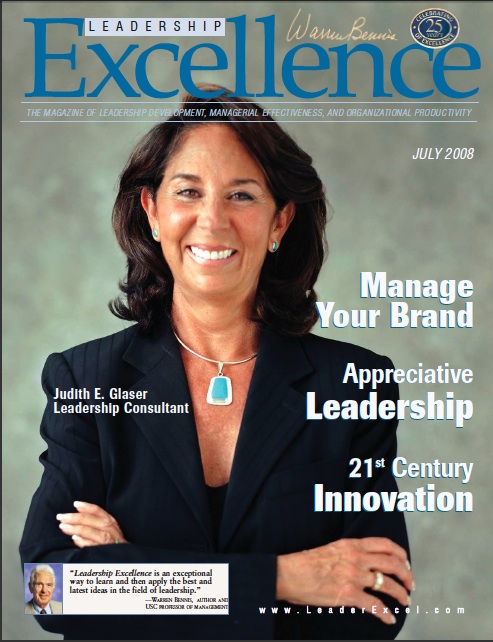By Judith E. Glaser and Nancy Snell | Leadership Excellence
Published February 2006
Move beyond fear.
Even though technologies enable us to dissolve boundaries of space and time and connect us in exciting ways, we still face the same old challenge: to dissolve boundaries among colleagues, to build trust, and to engage our people.
We-centric leaders lift people out of fear, frustration, and anger, which cause people to disengage from each other. They create a culture that enables colleagues to be connected, involved in living the values and vision.
 When people feel disconnected, they become reactive, project their anxiety onto others, create more fear, blame others for what is missing in their lives, reject first to avoid being rejected, and disengage.
When people feel disconnected, they become reactive, project their anxiety onto others, create more fear, blame others for what is missing in their lives, reject first to avoid being rejected, and disengage.
When colleagues work in concert, they learn from each other, develop higher-level skills and wisdom, meet performance goals, and turn breakdowns into breakthroughs. When leaders turn to others for suggestions and value them, they create a community that looks forward to coming to work.
Learn to manage three dynamics: First, learn to manage your own reactions—bullying, intimidating, and micromanaging don’t get results; inspire others to higher performance. Second, put your ego behind you—what matters is what “we can do together” not what “I” can do. Third, let go of the past; focus on the challenges facing you and build healthy, mutually beneficial relationships.
Mastering these three dynamics changes everything. Your ability to lead will increase exponentially, and you will enhance your ability to create inspiring environments where people work together for mutual gain, growth, and understanding.
Rather than get tangled up in conversations about blame, fear, and frustrations about what is not happening at work, you establish a positive context for transformation by engaging people in ongoing conversations about what has, can, and will work to create a transformation. In doing so, you focus on what needs to happen to address the challenges and, with that focus and commitment, you develop into the best company possible. Rather than trying to fix the past, you create the future with others.
Hardwiring the DNA
As a leader, you can shape the experiences people have at work by reducing fear and inner focus and creating cultures that facilitate enhanced sensitivity, mutual support, vital communication, and engagement in the strategy. When we live in toxic fearbased cultures, we become unhealthy in mind and spirit. We can react like cancer cells—like cells that stop communicating with the immune system designed to protect the whole body, cells that start to grow all over because they have lost their sensitivity to other cells, and cells that create roots and lock themselves in isolation, drawing nourishment from the body and weakening it.
When we live in fear, we withdraw, build our own “story” of reality, imagine others are out to get us, and react accordingly. We stop turning to others for help and stop taking feedback and advice from others. Universal fears include the fears of being excluded—so we create networks and exclude others first. Being rejected—so we reject first. Being judged unfairly—so we criticize and blame others. Failing— so we avoid taking risks and making mistakes. Losing power—so we intimidate others to get power. Feeling stupid—so we either don’t speak up or speak too much. Looking bad in front of others—so we save face.
Universal desires include the desire to be included on a winning team, be appreciated, successful, powerful, creative, smart, and influential; to have a leadership voice and meaning and purpose; to learn, grow, and explore.
When we perceive the world through a lens of fear, our egos drive us into habit patterns of protection. Over time, we incorporate defensive behavior patterns into our daily routines. We turn away from others when we are coming from protective behaviors, rather than turning to others for help in making vital changes in our lives.
Unleashing Humanity
Leaders create cultures where all team members can contribute their talents and potential. Potential is often invisible—yet to be discovered. It’s born out of the healthy interactions of one person with another. As we interact, we trigger responses.
Once you learn new strategies and techniques for rewiring your life, relationships, and workplace from those that are focused on fear to those that are focused on achieving outrageous results, your life (and the lives of others who work with you) will radically shift. When we live in a positive, inspiring, interdependent, catalytic, expressive workplace, we all share the power for turning a toxic culture into a healthy, we-centric, inclusive workplace. From this new vantage point, you gain a new perspective about what you can create with others.
Try This
When colleagues work together to discover Best Practices, they shift from focusing on the negative, refocusing on looking for the positive practices that help the organization grow to its potential. Best Practices represent what is good and what works, and it defines what it means to be a worldclass company that attracts customers. Sharing Best Practices is a way of elevating the skills and talent of everyone.
Create a Best Practices forum to change the focus from loss to gain.
- Bring a team together to discover and share Best Practices.
- Choose people who work in different ways can raise the IQ for everyone.
- Use the Best Practices framework to catalyze cooperation and teamwork among colleagues who come from different areas and work in different ways.
- Ask team members to think of things they do that have a positive impact.
- Ask the team members to describe what they are working on, what approaches they are taking, what impact they are having, and how to transfer this knowledge to others.
- Each member of the team presents these Best Practices to colleagues.
- The facilitator captures what each person is doing to create success.
- Participants ask questions to clarify the Best Practices and to learn how to transfer them to other situations. The end result is that people feel heard, and valued.
The hardest part of leadership is that everyone wants to play an important role and be recognized for their contributions. Sometimes leaders find it difficult to manage the relationships, the competing demands and needs, and the lack of resources—and so territoriality arises. Sometimes we lose our sensitivity to others. We become so enchanted with our own notoriety and entrenched in our own successes that we forget to honor others for their contributions.
Leaders need to create a feedback-rich culture so that everyone is open to feedback on their ideas and behavior. This way everyone grows. As a leader, you can promote mutuality by tapping into the vital instinct of growth. You can encourage everyone to be sensitive to personal and group boundaries, while helping them to see how personal growth can best be achieved by expanding opportunities for growth of the enterprise.
Leader Behavior
We often turn to turf wars, silos, and territoriality when we fear we are losing what we hold dear. Fear drives us into our I-centric behavior, and we protect rather than partner.
Health comes from creating environments that honor the seven universal desires we all have for being valued, for making contributions, for expressing ourselves:
- Audit yourself and see if you are creating environments that acknowledge the seven key universal desires.
- If you are not creating environments that encourage mutuality and support, are you open to feedback?
- Identify your areas of strength. Continue to do more of this, because it creates healthy environments.
- Identify your developmental opportunities—leader behaviors that you have not been practicing that create a supportive, healthy culture.
- Create opportunities daily to experiment with the leader behaviors that you have not been practicing.
- Monitor your impact. Notice how you can reduce territoriality and increase positive energy and support.




